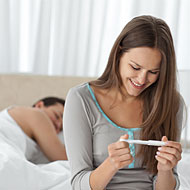Emergency Contraception
Planning a baby is one of the most important decisions of a woman’s life. Fortunately, you can lead an active sexual life and minimize your chances of getting pregnant by using any of the contraceptive methods easily available. Couples can choose from various contraception methods, like condoms (male or female), birth control pills, diaphragms and intrauterine devices just to name a few.
These contraceptive methods are effective in preventing pregnancy, if used before or during sex. In case you’d like to use a birth control measure after a sexual act, you do have the option of emergency contraception.
What is Emergency Contraception?
Emergency contraception or "the morning after contraception" is a form of birth control that you use after you have had unprotected sex. Women usually consider emergencycontraception if they’ve engaged in unprotected sex, or if they think that their method of contraception may have failed. You can use emergency contraception if –
- The condom came off or tore
- The spermicide tablet you used did not melt before sex
- You did not use any form of birth control
- You missed a couple of birth control pills in a month (depends upon the brand)
- Your diaphragm slipped or tore
- Your intrauterine device came out
- Your vaginal ring was placed too late or removed too early
You can use emergency contraception immediately or even up to five days after having sex. Of course the sooner you use emergency contraception, the more effective it is likely to be. Do not use emergency contraception as a regular form of birth control. Other contraceptive methods are much better and safer in the long run. Speak to your doctor and find out which birth control methods best suit you and your lifestyle.
What are the Types of Emergency Contraception?
There are two types of emergency contraception:
- Emergency contraceptive pills
- Intrauterine Devices
Emergency contraceptive pills:
These pills contain a much higher dosage of the same hormones that are present in regular birth control pills. Emergency contraceptive pills are available at most pharmacies, though you may need a prescription for some of them. Some of these pills are only recommended for women who are above 18. If you feel sick or throw up after taking an emergency contraceptive pill, speak to your doctor immediately.
Intrauterine Device:
This is a small T-shaped device that your doctor will need to place into your uterus, within 5 days of unprotected sex, to prevent pregnancy. You can keep the intrauterine device for the next 10 years as a regular birth control measure or you can get it removed after you get your next period.
How do emergency contraceptives work?
Unlike abortive methods, emergency contraception starts working before pregnancy takes place. These contraceptives prevent pregnancy and therefore, they do not work if a woman is already pregnant.
If used in time and in the right manner, emergency contraceptives can be quite effective.
The pills prevent the egg from leaving the ovary or may keep the sperm from fertilizing an egg. Medical researchers are still trying to determine if an emergency contraceptive pill can keep a fertilized egg from attaching itself to the uterus.Statistics show that if taken within 24 hours of unprotected sex, it can prevent 95% of pregnancies.
How doe Intrauterine Device Works?
When inserted into the uterus, after unprotected sex, this device prevents the sperm from joining the egg. It can also keep a fertilized egg from attaching itself to the uterus, thereby preventing pregnancy. Statistics show that only 1 in1,000 women to use the intrauterine device as an emergency contraceptive will get pregnant.
What are Side Effects of Emergency Contraceptives?
Unfortunately, you may experience a few side effects after using an emergency contraceptive pill. Some of the common emergency contraceptive pill side effects include:
- Nausea and vomiting
- Headaches
- Dizziness
- Cramps in the lower abdomen
- Tenderness in the breasts
- Fatigue
- Irregularities in the menstrual cycle
The risks associated with the intrauterine devices are much lower, compared to the pills. However, some of the side effects that could result from the intrauterine devices include:
- Heavy bleeding during periods
- Abdominal cramps
- Pelvic infections
It is common for a woman to experience emergency contraception side effects; however they should not be ignored. Speak to your doctor or your pharmacist in case you notice any of these side effects, especially dizziness, nausea and vomiting. There is a chance of getting pregnant, in spite of using emergency contraceptives. Take a pregnancy test, just to be sure, if your next period is delayed. There is a lot of information you can get on emergency contraceptives through various helplines and online resources. You can then discuss all these options with your gynecologist who will help you to make an informed decision.


